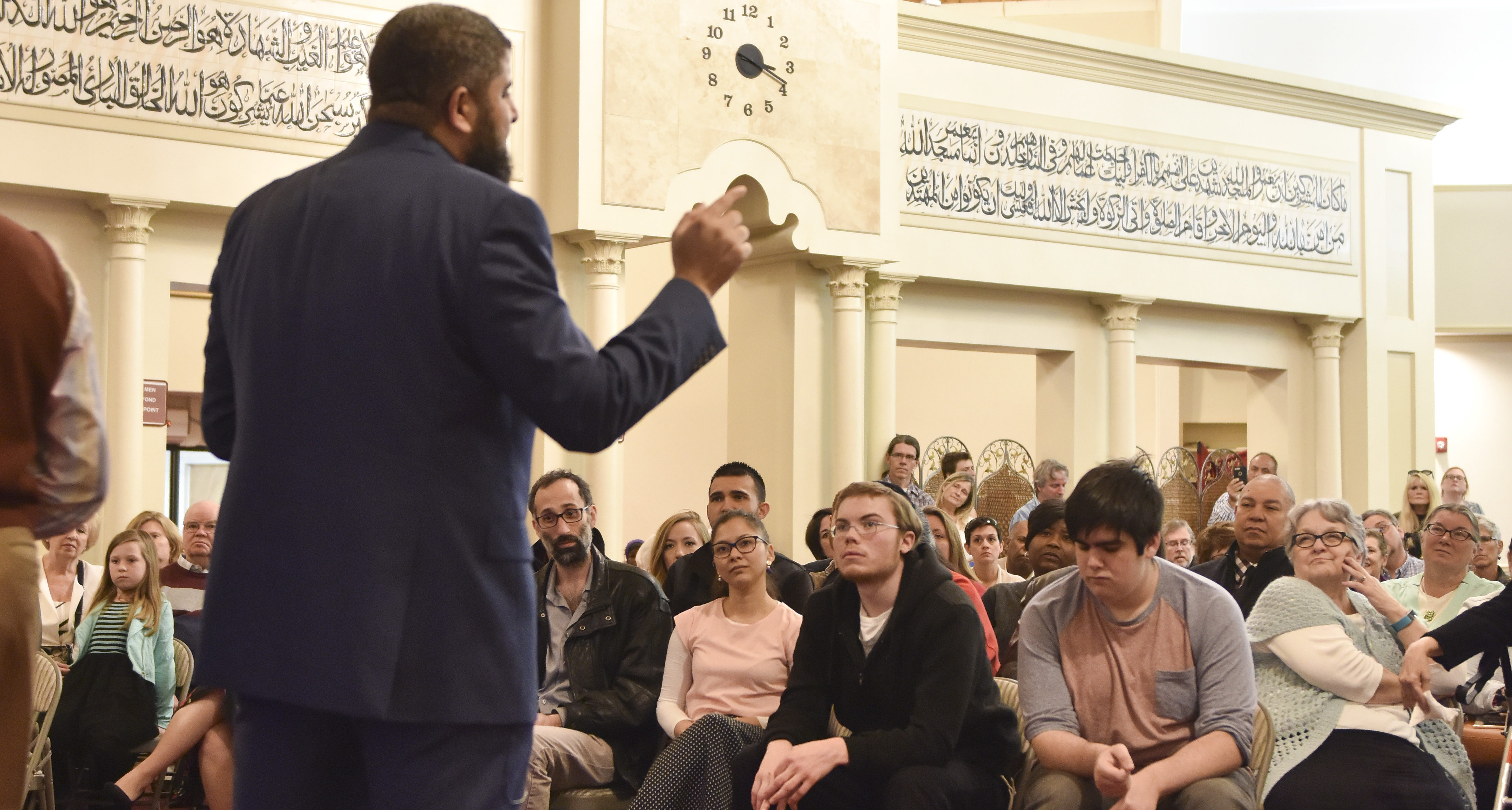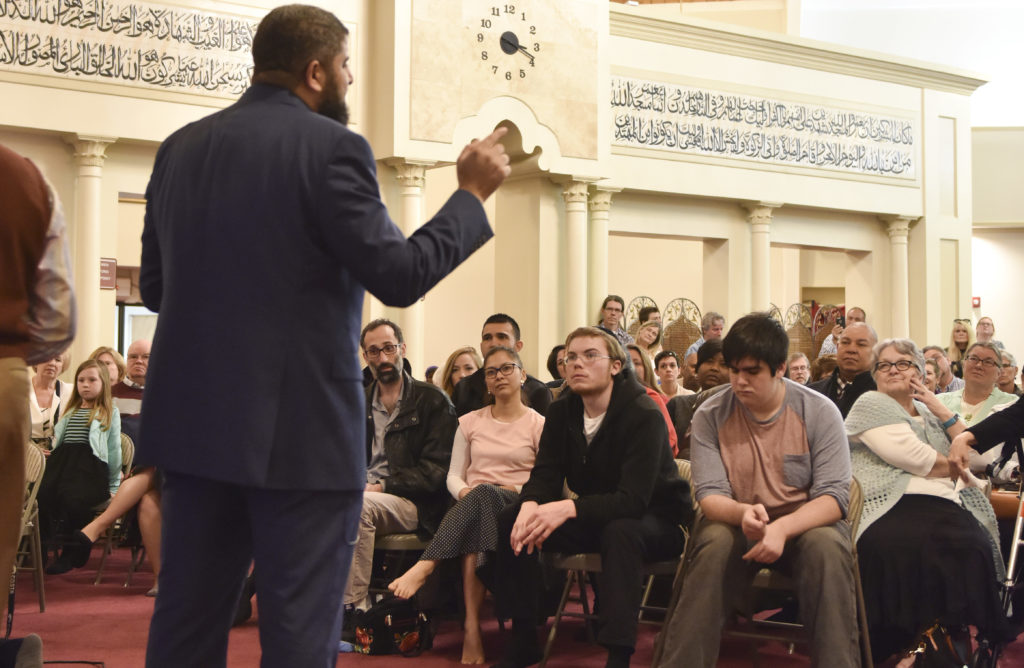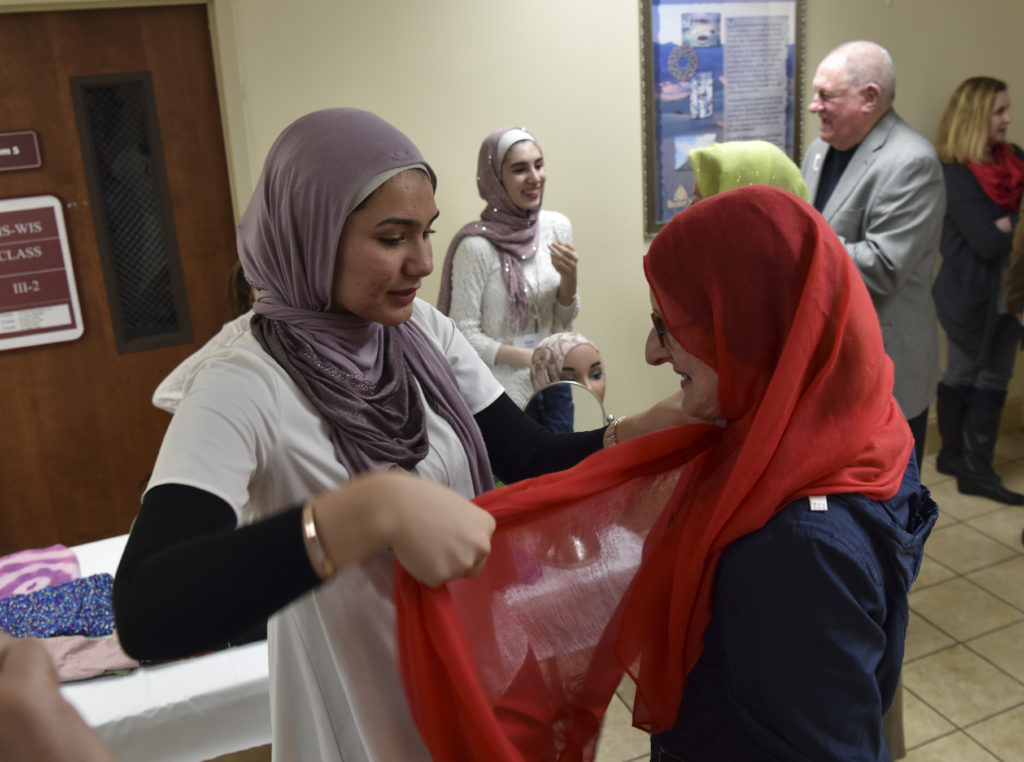
By Ariel Worthy
The Birmingham Times

Among the more than 1,000 people who showed up for the recent open house at the Crescent Islamic Center in Hoover was the Sansom family.
Ken Sansom, his wife, Natalie, and daughter, Maxie, heard about the open house during an interfaith prayer at the Levite Jewish Community Center on Montclair Road.
“It sounded like a good opportunity to see what goes on here,” Ken said. “I think everybody needs to strive for better understanding of different faiths and cultures to make America work.”
Natalie commended leaders of the Islamic Center for granting access to the public.
“Opening their center and allowing us in showed the love and pride they have in their culture. That, to me, is a great thing,” she said. “It’s beautiful seeing the openness.”
People of all races, religions, and cultures parked blocks away and walked through bright sunlight to attend the event. Guided tours of the center, which houses a mosque, were offered every 30 minutes. Short talks were given on a variety of subjects, including Introduction to Islam, the Sharia American Muslims Live, and Women in Islam. A question-and-answer session provided additional information. And attendees had an opportunity to observe the late-afternoon congregational prayer called Asr.
“In times like this, shying away from dialogue and conversation is not an option,” said Ashfaq Taufique, president of the Birmingham Islamic Society (BIS), the largest Muslim community in Alabama. “We need to engage in conversation with all these people, most of whom have never come here before. I’m hoping that people make new friendships and start talking to each other.”
There is misunderstanding about who Muslims are in regards to topics like Sharia law, for instance, which is “maliciously misunderstood,” Taufique said. In an effort to explain the concept, he held a lecture for open house visitors.
‘Go To The Source’
Andrew Harris, of Birmingham, was among those in the audience.
“If you need an answer go to the source,” he said. “The first thing [Taufique] said about [Sharia law] is that it follows the law of the land, [which] is a principle most Americans believe in, as well. If you have not grown up in this faith and you do self-research, you’re going to go down the wrong path. That’s why you go to the source. They can answer more questions in five minutes than I can in a year.”
Maxie Sansom said the visit was an educational experience.
“Last year, my history class informed us about all of the different religions in the world, so I had an understanding of the Islamic faith,” she said, “but seeing it in person is completely different. It felt more understandable.”
Stacy Walters, 33, a Samford University student, said she was impressed by what she saw and heard.
“[Muslims] are beautiful and peaceful, loving and kind, and generous,” she said. “There’s nothing to fear except the things you create in your mind. I hope everyone who comes here today understands that they are people first.”
Farook Chandiwala, founder of the BIS outreach program, said the Quran, the Muslim holy book, emphasizes peace.
“We are not against America. We are not against Christians, Jews, or anybody,” he said. “A verse in the Quran says, ‘Killing one human being is like killing all mankind, and saving one human being is like saving all mankind.’ We must help them understand us.”

The Role of Women
Another misconception that needs to be addressed is the role of women in Islam, organizers said.
Isha El-Amin, 57, said Muslim women have rights just like everyone else.
“We have the right to vote, drive, work, raise our kids,” she said. “Our money is our money. We pray just like everyone else. We are completely normal. There is nothing odd about us.”
El-Amin, who was raised as a Baptist, converted to Islam in 2002.
“I didn’t know anything about Islam,” she said. “I knew something needed to change in my life, so I prayed. I met my husband, and he helped me understand more. I realized it was the kind of character I needed.”
After she converted, El-Amin said she would occasionally get offensive questions.
“Some people have looked at me strange and asked, ‘Are you a terrorist?’ My answer: ‘No I’m not a terrorist.’ Questions like that hurt my feelings,” she said. “I can understand that if you’re ignorant and don’t understand our religion you might ask those things. Many of the same people in the Bible are in the Quran. We acknowledge Jesus and respect him. As Muslims, we respect all prophets. If people choose to understand, they will discover that we all worship the same God.”
Ashley Strong, 26, said she sees comparisons between blacks and Muslims when it comes to discrimination.
“I might not experience it religiously, but there are a lot of similarities … and you see what they go through all over the news,” she said, adding that it was “brave” for the Muslim community to hold the open house.
The Importance of Education
Talha Malik, who works at the Red Crescent Clinic, a facility that partners with the BIS to offer free services to anyone in the community, said it is important to educate people about what the faith represents.
“I grew up as a Muslim, and I know … that ISIS and people like them have highjacked our faith. We want people to know that is not what Islam is about,” said Malik, who is a doctor at the University of Alabama at Birmingham (UAB).
“I see a lot of international people, and I feel very much at home at UAB,” he said. “But when I leave UAB and see the news or online messages from people, it’s very negative and harsh. It’s painful.”
Malik said he also has learned to change his view of other religions.
“I had a negative perception about a lot of things dealing with Christianity, but being friends with a pastor who was a nurse at the emergency room where I worked, seeing him and how sincere he was in his faith, I found a much greater respect for his faith than I had before,” he said. “I see that happening in other places, as well. When we get to know each other, there is no doubt in my mind that we will find that the things we have in common are so much greater than the things that divide us.”
What is Islam, and what do Muslims believe?Understanding Islam begins with looking at the basic beliefs (Five Pillars of Faith) and required rituals (Five Pillars of Worship) of Muslims, as well as the different Islamic sects to which Muslims may belong. Islam’s Five Pillars of Worship and Five Pillars of Faith provide the foundation of a Muslim’s daily spiritual life. Although all true Muslims share these beliefs and rituals, Islam is divided into several different sects. The Five Pillars of Worship In the Islamic faith, Muslims are expected to fulfill five fundamental acts of worship. The Five Pillars of Worship (arkan al-’ibada) are the basic acts involved in being a believing and practicing Muslim, but each pillar is also a gateway to deeper understanding and greater spirituality as one grows in the Islamic faith. Shahada is the Muslim profession of faith. A person becomes a Muslim by making the basic statement of testimony or witness: “I testify that there is no God but God, and I testify that Muhammad is the Messenger of God.” Variations of the shahada are used in different situations. Salat is the formal, ritualized prayer performed at five specified times each day, with the worshiper facing Mecca, the holiest city in the religion of Islam. Salat consists of a sequence of recitations and bodily positions, including prostration with one’s forehead touching the ground. Zakat is an obligatory charitable contribution, theoretically due annually from every Muslim at the rate of 2.5 percent of liquid assets and income-producing property. Zakat supports charitable works and the promotion of Islam. Saum is the dawn-to-dusk fast done each day during the ninth month of the Islamic calendar (Ramadan). During this time of spiritual renewal, Muslims are not supposed to eat, drink, or engage in sexual intercourse. Hajj is the pilgrimage to Mecca during the twelfth month of the Islamic calendar (Dhu al-Hijjah). At least once in his or her life, if physically and financially able, each Muslim makes the hajj. During the five main days of the hajj, those on the pilgrimage duplicate the ritual first performed by Abraham, including circling the sacred shrine (Ka’aba), standing on the plain of Mount Arafat, and offering a sacrifice. The Five Pillars of Faith In Islam, the Five Pillars of Faith (not to be confused with the Five Pillars of Worship) provide a brief and convenient summary of basic Muslim beliefs:
Islamic Sects Although Sunnis make up the majority of Muslims, not every Muslim belongs to the same Islamic sect. A Muslim’s Islamic beliefs may take one of these forms: Sunni Muslims include 84 to 90 percent of all Muslims. Sunni means “tradition,” and Sunnis regard themselves as those who emphasize following the traditions of Muhammad and of the first two generations of the community of Muslims that followed Muhammad. Several movements to reform Islam have originated mainly in the 20th century. Some are limited to one country and others have a broader influence. Most are Sunni movements, such as the Wahhabis, the Muslim Brotherhood, and Jama’at-i-Islami. Shi’ite Muslims comprise 10 to 16 percent of all Muslims; they are the “party of ’Ali.” They believe that Muhammad’s son-in-law ’Ali was his designated successor (imam) and that the Muslim community should be headed by a designated descendent of Muhammad. Three main subgroups of Shi’ites are Twelvers (Ithna-’Asharis), Seveners (Isma’ilis), and Fivers (Zaydis). Sufis are Islamic mystics. They go beyond external requirements of the religion to seek a personal experience of God through forms of meditation and spiritual growth. Several Sufi orders, comparable to Christian monastic orders, exist. Most Sufis are also Sunni Muslims, although some are Shi’ite Muslims. Many conservative Sunni Muslims regard Sufism as a corruption of Islam, although most still regard Sufis as Muslims. Baha’is and Ahmadiyyas are 19th-century offshoots of Shi’ite and Sunni Islam, respectively. Baha’is consider themselves the newest of the major world’s religions but recognize that historically they originated from Shi’ite Islam in the same way that Christianity originated from Judaism. Ahmadiyyas regard themselves as Muslims. Most other Muslims, however, deny that either group is a legitimate form of Islam and regard members of both groups as heretics—people who have corrupted and abandoned Islamic belief and practice. Druze, Alevis, and ’Alawis are small, sectarian groups with unorthodox beliefs and practices that split off from Islam. Druze and Alevis do not regard themselves as Muslims and are not considered Muslims by other Muslims. ’Alawis have various non-Islamic practices, but debate continues as to whether they should still be considered Muslims. Source: Islam for Dummies |




